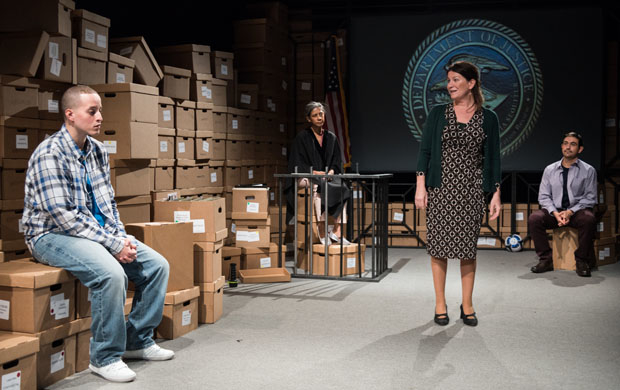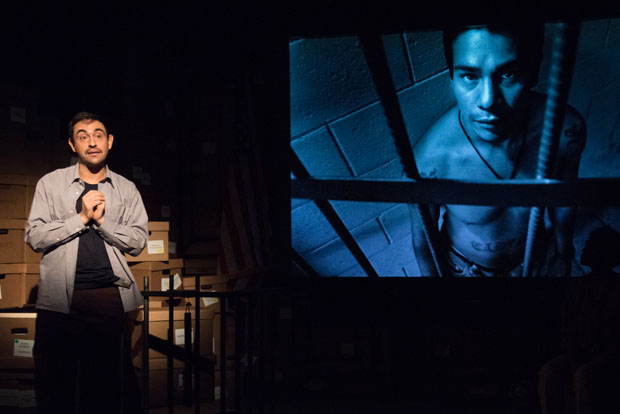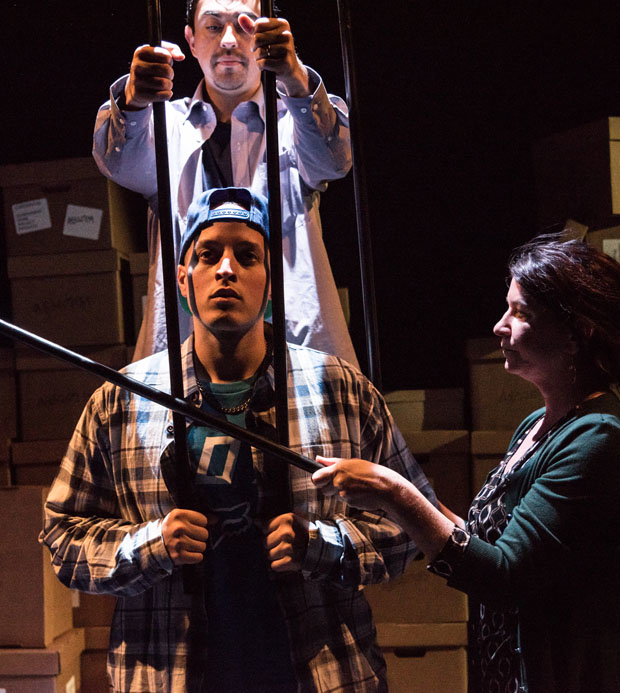De Novo

(© Russ Rowland)
In the last six years, U.S. Customs and Border Protection has apprehended over 250,000 unaccompanied minors attempting to unlawfully cross into the United States. We learn this in the opening moments of Houses on the Moon's documentary play De Novo, now performing as part of the inaugural season of Next Door @ NYTW. Playwright and director Jeffrey Solomon breaks through the cold, hard wall of that number with one individual story, compassionately delivered by a nimble ensemble.
The play focuses on the true story of Edgar Chacoy-Guzman (Manny Ureña). His mother, Margarita (Zuleyma Guevara), left him with relatives when he was just a baby so she could work in the United States and send money back to Guatemala. But when the criminal gang Mara Salvatrucha (better known as MS-13) begins targeting Edgar at the age of 14, Margarita pays a coyote to smuggle him across the border to her. Unfortunately, there are gangs in her L.A. neighborhood too, and Edgar soon gets involved with them. He inevitably lands in juvenile detention, where counselor Santiago Sanchez (Camilo Almonacid) tries to convince him to walk away from gang life. Edgar's attorney, Kimberly Salinas (Emily Joy Weiner), just tries to keep him from being deported.

(© Russ Rowland)
Out of a quarter of a million options, Houses on the Moon bravely chooses a case guaranteed to evoke ambivalence. All indications are that Edgar is a timid boy ensnared by forces he can't control. When the incredibly sympathetic Ureña looks at us with watery eyes and says that he was afraid to be out on the streets without the approval of a gang, which is why he joined, we believe him. And yet we are not entirely convinced that moving to Virginia with his aunt (the proposed terms of his release from detention) will keep him off the streets — there are gangs there too. "It’s a mental sickness," says Guatemalan journalist Byron Vasquez (a passionate and convincing Almonacid), and we begin to understand gang affiliation as an addiction: started to alleviate pain and very difficult to quit.
Solomon stages Edgar's complex story with efficient theatricality. With the exception of Ureña, all the actors take on multiple roles (Weiner, in particular, is excellent at distinguishing her characters with dialects and physicality). This presents a challenge to costume designer Genevieve V. Beller, who impressively selects costumes for each actor that encapsulate the range of characters they are called to play. Still, the use of paper signs (like one with the Lacoste logo meant to signify Edgar changing into preppier clothes) feels like a lazy choice. Why not just pop his collar?
Lawrence E. Moten's useful set is similarly transformative: The railing that forms the judge's bench detaches to become the bars of Edgar's jail cell, held up by members of the ensemble as they recite his psychiatric assessment. Projection designer Donna Decesare fills out the limited world of the stage with striking photos depicting the confusing, violent world of MS-13. They may be covered in tattoos and throwing gang symbols, but we cannot help notice that some of these "criminals" look no more than 10 years old, child soldiers in a drug war our government helps to perpetuate.

(© Russ Rowland)
Remarkably, De Novo is constructed entirely from official documents: court transcripts, interviews, and police reports. To emphasize that Edgar is just one of many, Moten surrounds the stage with file boxes stacked to the ceiling, a mountain of documents on the so-called undocumented. One need not embellish to convey just how heartbreaking these cases are, and Houses on the Moon never does. By delivering a clear-eyed yet still deeply moving presentation of just one, the company proves that it takes a certain amount of willful ignorance to see these kids as just statistics.










